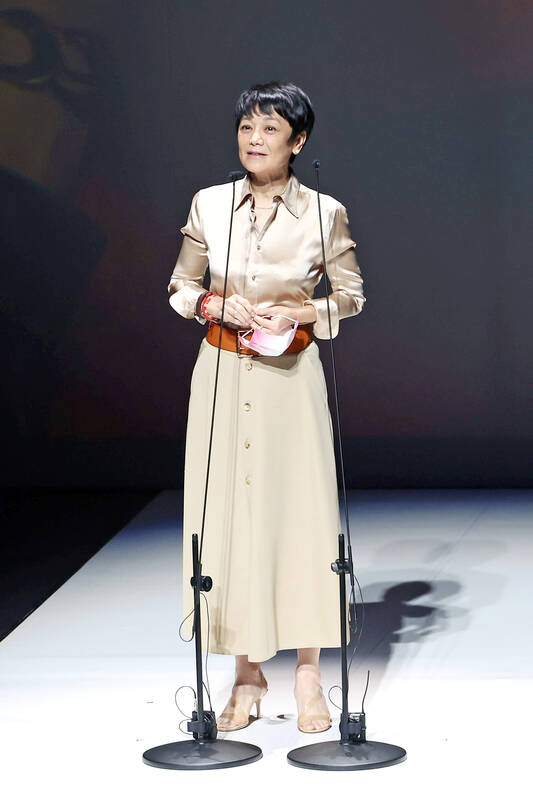A retrospective featuring dozens of lesser-known movies made in the 1980s during a period that was later characterized as the Taiwan New Cinema movement, launched in New Taipei City on Friday evening.
Thirty-one movies and short films made in Taiwan from 1982 to 1987 were selected for the retrospective “Taiwan New Cinema: Revisited” and are to be screened at the Taiwan Film and Audiovisual Institute (TFAI) until Nov. 27.
The selection includes 1983’s Kendo Kids (竹劍少年) by director Chang Yi (張毅). The coming-of-age film tells the story of a group of high-school students who learn the harsh reality of the adult world in the port city of Keelung.

Photo: CNA
Director Chen Kun-hou’s (陳坤厚) My Favorite Season (最想念的季節) is also showing. The 1985 romcom depicts an independent woman who battles to find her footing in Taipei after realizing that she is pregnant by a married man.
At the opening of the film festival, Chen said the movie touches upon an issue that was seen as shocking at that time.
“But we tried to provide an alternative way of looking at it ... to explore different possibilities of handling this kind of issue,” he said.
The movie’s lead actress, Sylvia Chang (張艾嘉), who is now 69, said that of the approximately 100 movies she had been involved in over her 50 years of working in the industry, the romcom was one of her favorites.
The actress and filmmaker, who won the film category of the National Award for Arts on Friday, said filmmakers in the 1980s were not preoccupied with the idea of making something new or innovative.
“At that time, we were just hoping to tell the stories of our generation,” Chang said.
The Taiwan New Cinema movement was a breakthrough, because Taiwanese movies made during that period gained international recognition for the first time, institute president Lan Tsu-wei (藍祖蔚) said.
The movies were reflective of Taiwan’s sociopolitical situation in the 1980s and filmmakers at that time used their lens “to look at what was actually happening on our island,” Lan said, adding that the cinematic movement marked a clear departure from the period preceding it, in which martial arts, melodrama and political propaganda took center stage.
By hosting the retrospective, the institute is hoping to promote lesser-known Taiwan New Cinema films at home and abroad during 40th anniversary of the the movement’s inception, Lan said.
The institute looks forward to finding collaborators to take the retrospective on tour in other countries, he added.
Despite its focus on lesser-known films, the retrospective also features two internationally acclaimed movies: Edward Yang’s (楊德昌) A Brighter Summer Day (牯嶺街少年殺人事件), which won Best Feature Film at the 1991 Golden Horse Awards, and Dust in the Wind (戀戀風塵) by Hou Hsiao-hsien (侯孝賢).

Taiwan is stepping up plans to create self-sufficient supply chains for combat drones and increase foreign orders from the US to counter China’s numerical superiority, a defense official said on Saturday. Commenting on condition of anonymity, the official said the nation’s armed forces are in agreement with US Admiral Samuel Paparo’s assessment that Taiwan’s military must be prepared to turn the nation’s waters into a “hellscape” for the Chinese People’s Liberation Army (PLA). Paparo, the commander of the US Indo-Pacific Command, reiterated the concept during a Congressional hearing in Washington on Wednesday. He first coined the term in a security conference last

Prosecutors today declined to say who was questioned regarding alleged forgery on petitions to recall Democratic Progressive Party (DPP) legislators, after Chinese-language media earlier reported that members of the Chinese Nationalist Party (KMT) Youth League were brought in for questioning. The Ministry of Justice Investigation Bureau confirmed that two people had been questioned, but did not disclose any further information about the ongoing investigation. KMT Youth League members Lee Hsiao-liang (李孝亮) and Liu Szu-yin (劉思吟) — who are leading the effort to recall DPP caucus chief executive Rosalia Wu (吳思瑤) and Legislator Wu Pei-yi (吳沛憶) — both posted on Facebook saying: “I

Sung Chien-liang (宋建樑), who led efforts to recall Democratic Progressive Party (DPP) Legislator Lee Kun-cheng (李坤城), was released on bail of NT$80,000 today amid outcry over his decision to wear a Nazi armband to questioning the night before. Sung arrived at the New Taipei District Prosecutors’ Office for questioning in a recall petition forgery case last night wearing a red armband bearing a swastika, carrying a copy of Adolf Hitler’s Mein Kampf and giving a Nazi salute. Sung left the building at 1:15am without the armband and covering the book with his coat. Lee said today that this is a serious

The Ministry of Economic Affairs has fined Taobao NT$1.2 million (US$36,912) for advertisements that exceed its approved business scope, requiring the Chinese e-commerce platform to make corrections in the first half of this year or its license may be revoked. Lawmakers have called for stricter enforcement of Chinese e-commerce platforms and measures to prevent China from laundering its goods through Taiwan in response to US President Donald Trump’s heavy tariffs on China. The Legislative Yuan’s Finance Committee met today to discuss policies to prevent China from dumping goods in Taiwan, inviting government agencies to report. Democratic Progressive Party Legislator Kuo Kuo-wen (郭國文) said